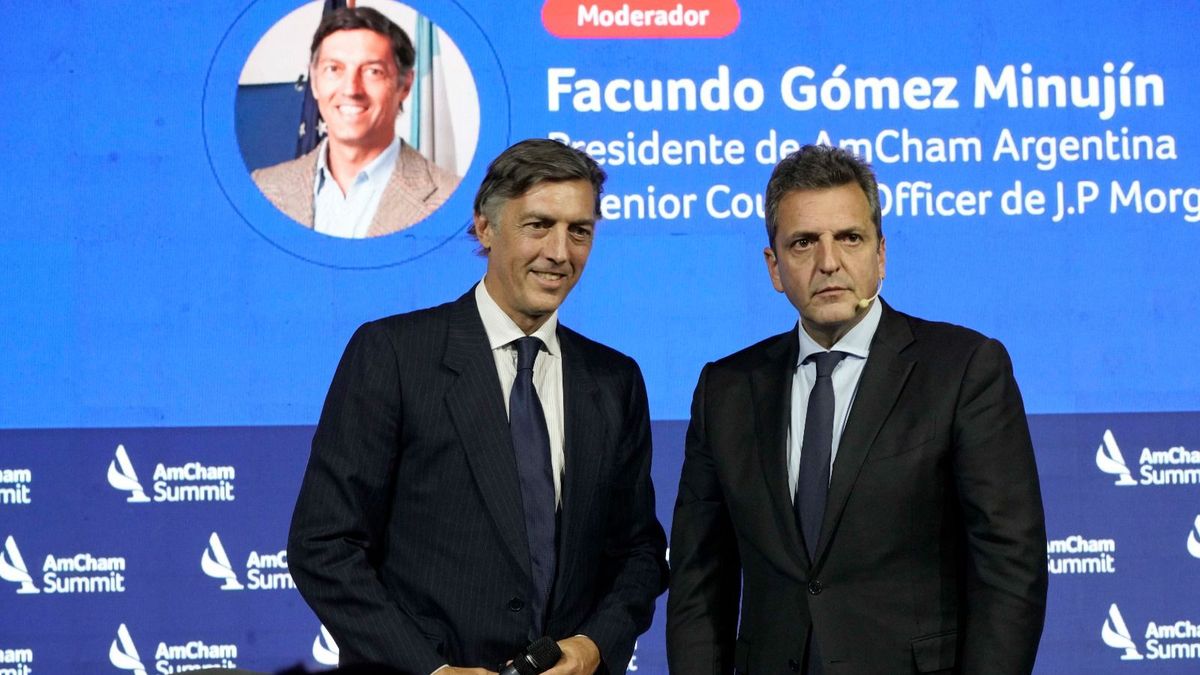In this sense, Facundo Gomez Minujin, head of the entity, warned in the opening speech of the meeting that the country is “Sailing in a bank of fog” and drew a gloomy panorama when anticipating that “A new recession with inflation is expected due to an unprecedented drought and the lack of foreign currency for imports.”
The minister explained that it is so “Basically because the political electoral years in Argentina always generate this idea that I preserve myself, I dollarize my portfolio, they generate this feeling of uncertainty and obviously that that the Central Bank has the capacity to intervene and that the State has some capacity to intervene is to have not tools to distort markets, but tools to generate certainty, tranquility, at times when political uncertainty can generate some difficult situation”.
Another of the speakers who made statements that impacted those present was Horace Rosati. The head of the Supreme Court of the Nation maintained “The Constitution mandates to defend the value of the currency which has to call our attention regarding the uncontrolled expansion of the monetary issue because that implies not defending the value of the currency and betraying the mandate of the Constitution that is above all of us ”.
In this regard, the attendees wondered what kind of measures the Supreme Court could eventually take in this regard, especially after the rulings by which the elections in Tucumán and San Juan were suspended five days before the elections were known.
Dollars
The lack of dollars and the complaints about the delays in the approval of the SIRAs occupied the attention of all the informal chats in the coffee breaks. Massa responded to this concern by indicating how the loss of foreign currency due to the drought is being dealt with.
I emphasize that a first decision was to stop importing almost 1,900 million dollars advancing in the construction of the Néstor Kirchner gas pipeline.
Another measure was anticipate energy purchases taking advantage of the end of the European winter. Against a budget of US$3.8 billion, they ended up spending US$1.9 billion.
He also explained that the yuan swap was activated, which will be for US$ 5,000 to be used in the April-August period. In this sense, He recalled that the swap is up to USD 19,000 million and that the operation will be renewed in June with the possibility of expanding it.
In the interview that Gómez Minujín conducted with Massa, the question regarding the agreement with the IMF was not lacking. In this sense, the head of the Palacio de Hacienda maintained that “the front load (advances) is statutorily one of the tools that the Fund has to carry out” and clarified that “Everything is on the table in the discussion with the Fund, absolutely everything”.
The IMF and the possibility of advancing funds to the country was one of the topics most discussed by businessmen within the framework of a general concern about “how to get to August”, when the primary elections will begin to clear up the political panorama.
A part of the attendees considered that “the Fund will not give us the money” while others foresee that the agency could have advances, but under the condition of a greater devaluation, something that they considered that the minister will not be willing to do because it would aggravate the social situation.
Besides, The minister clarified that in terms of public sector financing May maturities are being worked on with banks, mutual funds and institutional investors and “It can be traversed perfectly.” The head of the Palacio de Hacienda stated that he is not concerned about the second semester “because approximately 85% of the tenure of maturities is within the public sector.”
Candidacy
Facundo Gomez Minujinhe asked the question that the audience expected and that Massa had every intention of answering. “Are you going to be a candidate”? which provoked laughter in the auditorium.
Massa did not evade the answer, he recalled his long political career, he mentioned the important role that his family plays in his life: “The family I have is the most important thing I have built in my life. That’s a condition.”
Then, he asserted that “I believe that a government, even if it is a coalition government, has the obligation to provide certainty, and part of that certainty is not exposing its internal debates to society.”
In this regard, I state “We have to fight indoors. This of wanting to expose in a primary if the government has differences or not, the truth that seems to me a very serious mistake. Response that the audience interpreted as “If I’m not a consensus candidate, don’t count on me.”
But, when asked what measures he would take if he were president, Massa stated that he would say the following to the next president: “that on five issues it has to build State policies”. And, he went on to list them: the food issue, energy security, mineral resources -US$ 3,000 million of exports from mining companies will go up in 2021 to almost US$19,000 in 2030-.
The fourth point that I list is the one corresponding to the knowledge economy and the fifth is the institutional agenda. On this issue, he explained that “when a government chooses a course and appears to defend prebendary interests with justice instruments that end, from the idea of emergency, being permanent instruments, we are facing a problem.”
For Massa the solution to this problem is that “The emergency instruments that it has to apply justice must be emergency, and the fundamental remedies are the fundamental rulings, but we cannot continue in a scheme in which the transitory remedies to avoid State abuses end up being transformed into permanent measures to protect prebendary interests of economic sectors”.
Candidates
Of the speeches given by politicians, one of the ones that aroused the most interest was the one delivered by Patricia Bullrich since, according to the evaluation of the assistants, he gave definitions. “HOh, we have to put an end to the stocks, no businessman is going to put up money if they don’t let him get money. We are going to a single exchange rate, to the use of the dollar as a transaction currency, ”he asserted.
In labor matters, he said that “you have to work on the compensation, returning a reasonable number because today the compensation is not reasonable.” And he maintained that the ultra-active collective agreements must be removed “because it is a sword of Damocles on the companies; They are agreements from the year 1975, a whole system outside of what is today the way of working”.
Another opposition candidate Horacio Rodriguez Larreta, He had a presentation that was described as “generalist” by several of the businessmen, although, like Bullrich, he assured that he would go to a free exchange rate and bring the fiscal deficit to zero in one year.
One element that the businessmen rescued is that both Rodríguez Larreta and Bullrich pointed out that, if one of them won the elections, the technical equipment of the other would be available to the winner.
Source: Ambito




